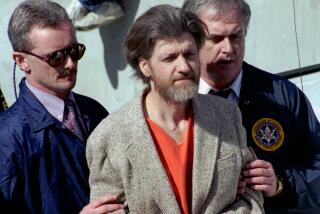Unabomber declines to give DNA in Tylenol poisoning case
- Share via
CHICAGO — Could the Unabomber and Chicago’s Tylenol poisoner be one and the same? FBI agents investigating the Tylenol killings, unsolved for nearly 30 years, want Theodore Kaczynski’s DNA, but they aren’t saying whether there’s any reason to believe he might be a match.
The FBI confirmed Thursday that it wanted a new DNA sample from Kaczynski, an Illinois native who last week filed a handwritten motion seeking to halt a government auction of his belongings on the grounds they could help prove his innocence in the Tylenol case.
Chicago FBI spokeswoman Cynthia Yates told the Associated Press that the bureau wanted DNA from “numerous individuals,” including Kaczynski, but she refused to provide details about any of the others.
Kaczynski has declined to provide a DNA sample voluntarily.
The Tylenol poisonings left seven people dead in the Chicago area in the space of three days beginning Sept. 29, 1982. One was a 12-year-old girl.
The victims took cyanide-laced Tylenol from packages that had been tampered with. The incident led manufacturers to develop tamper-resistant packaging.
The Unabomber and Tylenol cases have ranked among the country’s biggest criminal mysteries over the last three decades, but only intersected three weeks ago when authorities asked Kaczynski for his DNA. He was captured in 1996 and, to avoid the death penalty, pleaded guilty to three fatal bombings. He is serving a life sentence in a federal prison in Colorado.
Kaczynski’s attorney, John Balasz, said in an email exchange that he was convinced his client had no involvement and that he would not turn over a DNA sample unless ordered to do so by a judge.
“You’ve got to ask the FBI how serious they are,” Balasz said. “I think it’s probably more that they want to exclude him.”
In his handwritten court filing that began with the underlined word “Urgent,” Kaczynski wrote that he had “never even possessed potassium cyanide.”
Most of the original task force think James Lewis, a man now living in suburban Boston, was responsible for the poisonings. DNA was collected from him last year, but no charges were filed.
More to Read
Sign up for Essential California
The most important California stories and recommendations in your inbox every morning.
You may occasionally receive promotional content from the Los Angeles Times.










